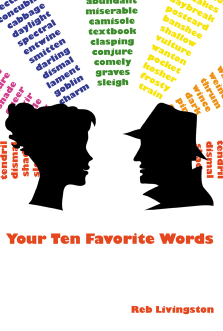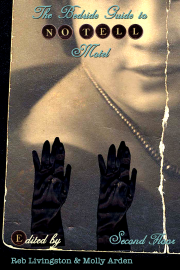How I Created and Then Published My Collaborative Chapbook with My Own Micropress and Made All My Chapbook Dreams Come True
A year after I finished my MFA, a fellow student and I wrote a collaborative poem. We thought it was swell and wanted to share it with other people so we submitted it to a poetry journal that recently published my work. It was one of the few journals I noticed publishing collaborative work. That magazine rejected it. The editor thought it was too long. We didn't agree, but oh well, rejection wasn't new to us. At the time we couldn't come up with any journals that seemed open to collaborative poems. I had recently launched my very own author site but at the time didn't really have much to put up. I suggested that we post the poem up there so when people googled us something would come up. My poem collaborator wasn't crazy about the idea, he had dreams of becoming famous collaborating poets, but eventually agreed.
The poem stayed up for a couple years. A poet I met at AWP in 2004 came across the poem and asked about collaborating. I had just finished reading Shanna Compton's and Shafer Hall's collaborative chapbook Big Confetti and was really impressed. I was jazzed up as the kids like to say and suggested to this poet that we collaborate. He agreed and then we didn't talk for several months, which is something that happens from time to time being temperamental poets and all. Anyhow, a few months later we were talking and he mentioned collaborating again.
Last year Jen Tynes did an exhaustive interview on our process, you can read that here.
In brief, via e-mail we began writing a long poem. My collaborator wrote a few lines, then I wrote a few and back and forth for several months. Sometimes we would respond quickly to one another and sometimes there'd be radio silence on My collaborator's side for several weeks eventually followed by a note half-apologizing and professing busyness. His "so many papers needing to be graded" woes were annoying because at the same time I was BUILDING A HUMAN BEING in my womb. I was all "MAN UP and get writing!", but now see that approach was all wrong. I should have been more like "WORK LIKE A WOMAN and learn to multi-task!"
Anyhow, my due date was approaching and I did not want this project to be dangling any longer so I insisted we wrap it up -- and a few weeks after that, we did. At this point, I'm a little murky with all the exact details but basically what happened was I had a baby and shortly after that my collaborator was all "I'm gonna be a daddy!" and we didn't do anything with our collaborative project for the rest of the year.
After we settled into parenthood we returned to the project. I came up with a list of possible titles and we agreed on Wanton Textiles. We went through and re-edited each other's lines. I'm pleased with how we shaped it up -- all except for one edit I still regret agreeing to.
The original line was:
This ark ain't the Love Boat.
My collaborator changed it to:
This ark is not a love boat
We agreed on this compromise:
This ark’s no Love Boat.
Clearly the original line is far superior, but my collaborator made the case for "sophistication" saying "ain't" ain't sophisticated. I swear to God if anyone ever makes a similar case for sophistication again in my presence I'll kick his teeth in.
Anyhow, we finished editing our long poem and decided to send it out. I had my heart set on it being published by a chapbook press that I greatly admire. But the publisher did not have his heart set on it. He said he'd consider it again if it was "saucier" -- he wanted us to really sex it up. That was exactly not what we wanted to do with this project. Then I sent the poem to an online magazine that published some collaborative pieces by other poets. That editor didn't want it either. He was upfront and said it boiled down to "taste," that the language was "sometimes flat-out flooring" but he didn't see a "a sort of dramatic-ness...oratory." I appreciated his comments, but didn't feel like he got what the poem was intending either. I felt misunderstood. I always feel misunderstood.
At this point I think my collaborator got frustrated with my choice of potential publishers and on his own (informing me only after the fact), he answered a blanket call for work from a new magazine started by recent grad school graduates. I was incensed. I looked at their their sloppy placeholder website (they didn't have a single issue up yet) and couldn't believe he just willy nilly sent it off to people we knew nothing about.
This new magazine took it, my concerns were unfounded and my assholiness exposed. The poem was presented very nicely as you can see here. The magazine (Fringe) also passed out a beautiful broadside of a section of the poem at AWP and nominated it for Best of the Net (which Eduardo says means absolutely nothing, but he's absolutely wrong on that).
So the long poem was successfully and "legitimately" published. But that is not the end of the story. I still wanted it to be a chapbook, but realized there had to be more to it. It occurred to me that I was relying on other poets to do something I was perfectly capable of doing myself. I was publishing work by other poets, why not my own? Why am I good enough to publish them, but not good enough to publish myself? Unlike the first two publishers I approached, I "got" the point of the project. Doesn't that make me the perfect publisher for it? I thought so.
Turns out I always had a publisher -- I just didn't realize it. It's like looking for someone else to fill all the holes in your heart. No my love, you must fill your own heart first.
So I proposed to my collaborator that we do a series of postcard poems (via e-mail) and then work those poems into the longer piece for a chapbook. Together wrote approximately 15 poems over a summer. A few of my postcard poems can be read at Beltway (scroll down).
Like any good editor, I layed out the book, got a proofreader, found an awesome designer (Charlie Orr) and wa-la, really awesome chapbook. That year I sent out around 50 review copies and probably traded another 50 or so. I think my collaborator sent out a few review copies too.
But is it any good? In the end I did all the work and promotion myself -- how can it possibly be any good if I had to do all that? You can reviews at Galatea Resurrects, MiPoesias, Asian American Poetry, berniE-zine and Jeannine Hall Gailey's blog. Or you can see how readers rated it on Goodreads. In fact, I gave it 5 stars myself -- aren't I the scuzbag?
If you want to buy a copy of Wanton Textiles for yourself you can buy it online here or check the bookstores listed on this page. If you're going to be attending the Geraldine Dodge Poetry Festival next month, there will be copies for sale in the giant book tent.
Was it expensive? A little -- I printed a lot of copies so my collaborator and I would both have enough, a short run of 150, cost $500. A smaller print run would lower that price -- once could direct more people to buy online, send out fewer review copies, etc. I paid the designer $100. In this case I didn't pay the proofreader because she was my sharp-eyed sister and owed me. I have a regular proofreader now who I would pay $50 for such a project. Postage did factor in, but in most cases I just included it with other books I was already sending out. Shipping (with insurance) 50 books to my collaborator cost a little money too.
Was it a lot of work? Yes, it was a fair amount. But it was worth it -- even if the sales sucked. Welcome to poetry publishing. Sales tend to suck.
The book is print-on-demand, so if the 500 or so folks who visited this blog yesterday to see me rage against contests each purchased a copy online, no problem -- all sales can and will be fulfilled. My press would clear $1450, and that would cover the publishing costs of almost 2 full-length books. If 10 of you purchased copies of this chapbook the press would clear $29 and I would be beside myself in delight and gratitude. If 1 person purchased the book today, the press would clear $2.90 and I promise to never accuse anyone of "chugging a lot of cock" again.
Next I will write about my publishing relationship with Bruce Covey.






1 Comments:
A great story and a brilliant book. I'm proud to own it.
Post a Comment
<< Home